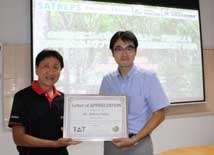Yokohama Rubber Co. has announced that it is participating as an official partner in an international joint research project on the utilisation of discarded rubber seeds, which aims to solve environmental problems through the effective use of natural rubber seeds.
Titled “Utilisation Technology of Rubber Seeds for Green Products to Mitigate Global Warming and Plastic Pollution”, the project has been selected as a research project for the Science and Technology Research Partnership for Sustainable Development (SATREPS) program, which is jointly operated by the Japan Science and Technology Agency (JST), the Japan International Cooperation Agency (JICA), and the Japan Agency for Medical Research and Development (AMED), with support from Japan’s Ministry of Foreign Affairs and the Ministry of Education, Culture, Sports, Science and Technology.
This research project is an international project being conducted jointly by industry, government, and academia in Japan and Thailand, the world’s largest producer of natural rubber. The project is being led by Associate Professor Shinji Kanehashi of the Graduate School of Engineering at Tokyo University of Agriculture and Technology.
Most of the natural rubber currently used by industry, including as a raw material for tyres, is made from the sap of the Para rubber tree. Most rubber tree seeds, except those used for reseeding, are discarded. This research project aims to contribute to solving such environmental problems as global warming and the problem of economic disparity suffered by agricultural workers through the creation of new biomass businesses made possible by the development of a sustainable and effective utilisation technology for Para rubber tree seeds, which are an untapped carbon-neutral resource.
Prior to becoming an official participant in this research project, Yokohama Rubber had been participating since 2023 in local surveys of natural rubber plantations through Y.T. Rubber Co., Ltd. (YTRC), the company’s natural rubber processing subsidiary in Thailand.
YTRC’s support for the research project was recognised in August 2024, when Associate Professor Kanehashi visited the company and presented it with a letter of appreciation from the Tokyo University of Agriculture and Technology.

